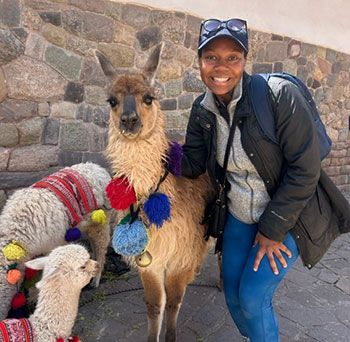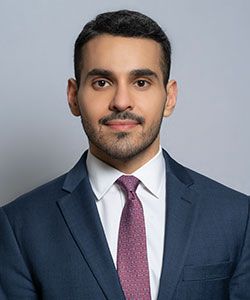In this spring 2025 newsletter, the Office of International Medicine Programs (IMP) at the George Washington University (GW) School of Medicine and Health Sciences (SMHS) is proud to introduce two (2) participants, third-year medical student Meredith Wells, and third-year resident Omar Yaghi, MD, who have continuously upheld SMHS’s mission to advance knowledge and transform lives.
Wells is part of the Global Health Scholarly Concentration (GHSC), a four-year extracurricular program for GW medical students looking to broaden their understanding of international health systems, diseases, and assessment techniques through educational sessions and experiential learning. Wells also is a Fulbright Fogarty Scholar and is currently conducting global health research in Peru during a gap year.
What inspired you to take a gap year to pursue global health research?
Wells: I came to medical school with a strong interest in global health. GW’s scholarly concentrations were a significant reason that led me to choose GW for medical school, and I was excited to join the GHSC. Over my time at GW, [the concentration] has enabled me to learn from renowned experts about how to build a career in global health.

With the support of IMP, I’ve had the opportunity to do a global health experience in between first and second year, and I spent two months in Rio de Janeiro, Brazil, working on tropical disease epidemiology and surveillance. Thanks to the opportunities offered through the GHSC, I was exposed to amazing research and career opportunities in this field, inspiring me to do even more. I always wanted to be a clinician scientist, so I wanted the opportunity to really nurture my research skills alongside with my clinical learning so that I could be prepared to take on that role in the future. With that in mind, I decided to pursue a research year, focusing on learning to develop my own projects and engaging with brilliant global health pioneers in a variety of countries, to prepare for a career in global health.
Tell us about the focus of your research in Peru. What specific health issues are you addressing?
Wells: As a Fulbright-Fogarty Fellow in Public Health, my research focuses on long-term ophthalmological effects of household air pollution in rural Peru near the Bolivian border. More than three billion people — the vast majority in low- and middle-income countries (LMIC) — cook on open fires and traditional stoves using solid fuels such as wood, dung, coal, charcoal, and agricultural crop waste. Exposure to the resulting household air pollution is a leading risk facing these populations, accounting for an estimated 2.3 million premature deaths annually and 91.5 million disability-adjusted life years.
I work with William Checkley, MD, PhD, a pulmonology and critical care medicine specialist at Johns Hopkins University, and his team to understand the effects of chronic household air pollution exposure in this region. We are investigating cardiopulmonary, obstetric, neurodevelopmental and ophthalmologic outcomes. On a typical day, the team is up and out in the field around 5-6 a.m. We drive outside of the city into the surrounding mountains, and complete home visits where we run a variety of clinical tests looking at these outcomes and measuring the amount of pollution in the homes. I evaluate the eyes of older women who have years of exposure to household air pollution, looking for conditions such as dry eye, corneal abrasions, and cataracts using a portable slit lamp in collaboration with a local ophthalmologist. Our afternoons are typically spent logging and analyzing our data.
Some of the challenges we face include language barriers and navigation in extremely remote areas. Although my team is Peruvian and all of us speak Spanish, in these remote areas, many of our participants speak local indigenous languages such as Quechua and Aymara, making communication a challenge, even for our Peruvian colleagues. We typically bring interpreters, but I’ve also had to take some Quechua classes at the local university.
During rainy season in these remote areas, where there are few roads, the terrain can become treacherous. More than once, our trucks have become stuck in the mud, and we’ve all had to get out and push.
How has your participation in global health research shaped your career goals and future residency plans?
Wells: The impact of this research year on my career trajectory cannot be understated. I have had the opportunity to meet a variety of mentors and colleagues in the field of global health who have opened many doors for further opportunities to work in global health. It has also given me the perspective as to what kind of residency program I would like to pursue, such as those with a commitment to global health, health equity, and strong mentorship and support for their residents in the pursuit of their passions.
For those interested in pursuing more global health opportunities, whether it be a dedicated research year or learning more about the filed, I would recommend reaching out to physicians or scientists in the field, who are often eager to teach and share new opportunities. I also would recommend speaking to other students interested in the field as well, and creating strong partnerships. Some of my most insightful colleagues have been other medical students engaging in their own projects in countries all over the world. The partnerships and friendships I’ve made with other medical students through the Fulbright-Fogarty program will last a lifetime.
Yaghi is a third-year resident in the Department of Medicine at GW SMHS. Originally from Bahrain, Yaghi is part of the International Residency Program, a graduate medical training program at SMHS designed to provide a strong clinical experience, as well as a basic overview of the American medical system. In February 2025, Yaghi was recognized for his high-quality patient care and attentiveness towards medical students, receiving a Learning Environment Accolade. The comment cited him as “one of the best residents and role models,” noting his kindness towards students and empathy towards patients. Not only did he receive an accolade, Yaghi also earned a chief resident position at the Washington DC VA Medical Center starting July 1, 2025.
You received a Learning Environment Accolade last month! Tell us more about how you strive to establish a positive learning environment.
Yaghi: Receiving this accolade is a meaningful affirmation that I’m contributing positively to medical education. Learning medicine is fascinating, but it can also feel alienating or intimidating. My approach is shaped by the residents who, during my education and training, offered that extra level of care and mentorship. Their kindness and dedication profoundly influenced my own journey, and I aim to offer the same supportive environment to our students. It’s a privilege to be part of our students’ medical education experience, and I genuinely enjoy this aspect of my work.
What’s your typical day-to-day as a resident, and what did your path to becoming chief resident look like?
Yaghi: Internal medicine’s variety is both challenging and rewarding.

My daily routine can range from managing patients on inpatient wards, to providing consults for other specialties, to teaching residents during dedicated education blocks. Balancing clinical duties with research, teaching, and personal well-being has been essential. During residency, I actively pursued leadership opportunities through quality improvement projects, roles within the Graduate Medical Education (GME) House Staff Council and the GME Approval Committee. These experiences provided valuable insight into the complexities of medical training and strengthened my commitment to improving the learning environment within our intricate health care system. Supporting my peers and contributing to their growth has been incredibly fulfilling; I’m grateful for the opportunity to continue doing so as chief resident.
What overall advice do you have for international medical graduates (IMGs) who are interested in applying to U.S. residency programs?
Yaghi: My biggest advice for IMGs is to recognize the value of your experiences and how they can enrich the programs you join. The process is challenging, but your perspective and training are strengths, not limitations. I found it essential to stay true to my interests and values throughout the journey. Applying to programs that aligned with my goals made all the difference — I was fortunate to be part of a program that believed in me and supported my growth. Keep an open mind, be persistent, and focus on finding environments where you feel supported and inspired to grow.
We couldn’t be prouder to support bright medical professionals like Wells and Yaghi.
For more information about our programs for GW and international students and residents, please contact the SMHS IMP office at impinfo [at] gwu [dot] edu (impinfo[at]gwu[dot]edu) or visit our Programs page.